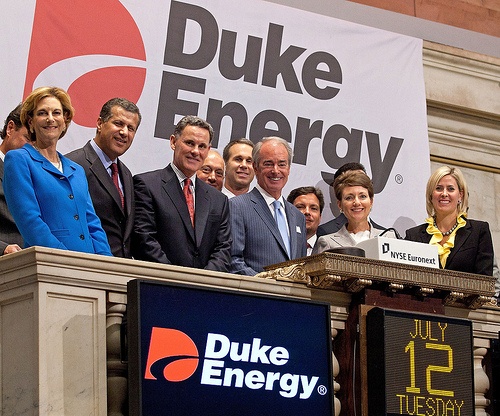Is Duke Energy favoring Wall Street over Main Street?

North Carolina Attorney General Roy Cooper is fighting Duke Energy's proposed 7.2 percent rate hike, arguing that it unfairly favors Wall Street investors while burdening consumers in a weak economy.
Cooper filed a brief last week with the N.C. Utilities Commission (NCUC) asking it to deny the increase, which is scheduled to take effect next month.
"The commission should come down on the side of consumers when considering a fair rate of return for Duke, especially in this economy," Cooper said.
Last year Duke Energy requested a rate increase that would have increased its revenues by about $646 million while raising the average residential customer's monthly bill by over 18 percent. That request was met with a storm of protest, with Cooper reporting that hundreds of North Carolinians wrote to him with worries about the plan.
The AG's Consumer Protection Division intervened in the rate case. At a November NCUC hearing, attorneys with the AG's office questioned whether experts who calculated the rate of return on equity for Duke Energy shareholders took into account economic conditions as required by state law.
The company's original rate hike request would have offered an 11.5 percent return on equity. The Utility Commission's public staff, responsible for representing the public interest, countered with an offer for a 4.9 percent hike and a 9.25 percent return. The final settlement includes a 10.5 percent return, which means an additional $125 million in revenues over the public staff's initial proposal.
Cooper doesn't think the settlement treats Duke Energy customers fairly. As his brief states:
The impact of the Stipulation’s proposed return and its resulting 7.2% rate increase on consumers is concrete and certain. As noted by many consumers in testimony at the public hearings, North Carolinians face economic challenges and a rate increase will have a detrimental impact on consumers who are finding it harder to make ends meet and pay for necessities such as utilities. By contrast, the expert testimony regarding return on equity is inherently speculative in that, in the end, the expert testimony largely consisted of educated guesses as to what different returns might mean for Duke in terms of Duke’s ability to keep Wall Street investors interested in the company’s stock.
The AG's brief notes that Duke -- which is currently in merger proceedings with North Carolina-based Progress Energy -- has said it's planning to file for another rate increase this year. So if there's any "adverse market reaction" to a return on equity below 10.5 percent, the utilities commission would soon get an opportunity to make adjustments, it argues.
"We want to work together to move our state forward, but a sharp increase now would be difficult for many North Carolina families and businesses," Cooper said.
Taking from the poor, giving to Google
A coalition of public-interest groups also filed a brief last week asking the NCUC to reject Duke Energy's proposed rate hike. The N.C. Justice Center, N.C. Housing Coalition and N.C. WARN cited concerns about the rate hike's impact on the poor, working families and seniors on fixed incomes.
The groups point out that Duke Energy's residential late-payment charge disproportionately impacts low-income customers and only compounds payment difficulties. They called on the NCUC to exempt low-income customers from such charges. They also charged that the company's shutoff notices amount to unfair and deceptive credit and collection practices.
"Shutoff notices should be limited in use, and the Commission should order remedial action to assist customers in paying their bills when behind on their accounts," the groups said in a news release.
As part of the rate-hike settlement, Duke Energy agreed to make an $11 million contribution to energy-assistance programs for low-income households. But in their brief, the consumer advocates make the case that the company should make ongoing annual contributions rather than a one-time payment.
The groups also raise concerns about how fairly Duke is distributing costs to various customer groups. They note that while the company is seeking to raise residential rates to finance new generation facilities, it's actively recruiting corporate data centers, which are heavy electricity users. Apple, Google, Facebook and IBM have opened data centers in Duke's North Carolina service area in recent years, also attracted by various state tax breaks and subsidies.
Duke Energy sets rates for each customer class -- residential, commercial and industrial -- based on when electricity load "peaks" because of extreme summer heat. So even though data centers use large amounts of energy year-round, that's not factored into the calculated costs of power plants and transmission.
"If the present course is allowed by the Commission, rates will continue rising each year to pay for expensive and financially risky new power plants to accommodate the extremely high electricity usage of new and expanding data centers recruited by Duke Energy," the groups said.
The allocation of costs for data centers is also likely to become an issue in any eventual Duke-Progress merger. The consumer advocates point out that Progress Energy uses a fairer method of calculating rates for different customer classes, and how the two different approaches will be resolved remains uncertain.
(Photo of Jim Rogers ringing the opening bell at the New York Stock Exchange last July by Ben Hider/NYSE Euronext via OhioCitizen.org.)
Tags
Sue Sturgis
Sue is the former editorial director of Facing South and the Institute for Southern Studies.
